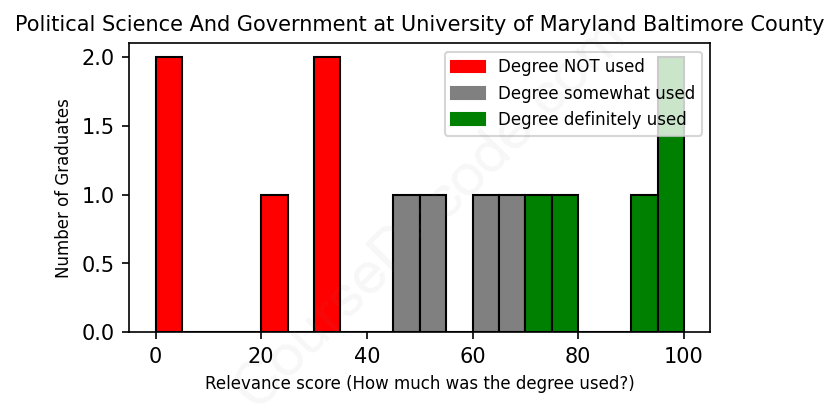
First, some facts. Of the Political Science And Government graduates from University of Maryland Baltimore County we've analyzed , here's how many have used (or NOT used) their degree in their career:

These are estimates based on AI analysis of 14 LinkedIn profiles (see below).
The verdict? Significantly below average. Overall, with an average relevance score of 53%, Political Science And Government graduates from University of Maryland Baltimore County have a much lower likelihood (-14%) of finding work in this field compared to the average graduate across all fields:
And for comparison, here's the chart for all profiles we've looked at across all degrees.
Also, after graduating, 64% of these graduates have pursued further education other than another Bachelor's degree (such as a Masters degree or other), compared to the average across all profiles of 35%. This suggests you may need more than just a Bachelors degree to be competitive as a Political Science And Government graduate.
See the details:
|
Relevance score: 100% We think this person has gone into a career highly relevant to their degree. We think this person has gone into a career highly relevant to their degree.
DEGREE INFOGraduated in 2011 from University of Maryland Baltimore County with a Bachelor of Arts - BA in Political Science And Government. Also pursued further education since (see below). JOB HISTORY SINCE GRADUATIONAcademic Program Coordinator Johns Hopkins Bloomberg School of Public Health Sep 2013 - Nov 2015 Academic Program Administrator  Johns Hopkins Bloomberg School of Public Health Oct 2015 - Feb 2020 Academic Program Manager  Johns Hopkins Bloomberg School of Public Health Feb 2020 - Present FURTHER DEGREES DONE SINCE GRADUATINGMaster of Arts - MAMorgan State University 2011 - 2013 ABOUTExperienced Academic Program Manager with a demonstrated history of working in the higher education industry. Skilled in Data Analytics, Leadership, Data Analysis, Adult Learning Methodologies, and Student Recruiting. Strong program and project management professional with a Master of Arts - MA focused in Higher Education/Higher Education Administration. |
The top 10 most common jobs done by the graduates we've analyzed (ranked most common to least) are:
It looks like the graduates from the University of Maryland Baltimore County who studied Political Science and Government have pursued a pretty diverse range of jobs. The most common roles include educators, administrative positions in schools and health organizations, and various internships, particularly in governmental settings. Many have found work in teaching—especially teaching English or humanities—which, while related to various social principles, doesn't heavily tap into the political science knowledge they likely gathered during their degree. Others have gone into more straightforwardly political roles, such as interns at the U.S. House of Representatives or working directly on political campaigns, which are much more aligned with their studies.
However, the connection to political science isn't as strong across the board. Many of the jobs these graduates have taken, particularly in teaching or administrative capacities, don’t directly utilize political science skills on a daily basis. While some jobs, like those involving policy research or positions in legislative offices, are clearly relevant, others focus on operational aspects or different fields altogether, such as sales and marketing, which don't require the specific insights into political systems that the degree provides. So, while there are notable exceptions where the political science background really shines, many of the roles align less directly with that field of study than you might expect.
Here is a visual representation of the most common words in job titles for Political Science And Government graduates (this is across all Political Science And Government graduates we've analyzed, not just those who went to University of Maryland Baltimore County):

Graduates from the University of Maryland Baltimore County with a degree in Political Science and Government seem to follow a variety of career paths, often influenced by their interests and experiences post-graduation. In the early stages of their careers—typically in jobs one to five years after graduation—many have taken roles that leverage their skills in communication, research, and program coordination. For instance, several graduates have found themselves working in positions related to education, public policy, and legal fields, such as teaching, administrative roles at educational institutions, and internships within government offices. There’s a clear trend toward public service and education, indicating that many graduates are utilizing their degrees in ways directly related to the principles they studied.
As these alumni progress further into their careers, around five to ten years post-graduation, a significant number appear to be solidifying their roles in more specialized and impactful positions. Many transition into higher-level roles within educational institutions or government, such as program managers, policy advisors, or legal professionals. However, some also branch out into areas that are not directly tied to Political Science, such as sales and marketing, or even teaching English abroad. This blend of relevant and sometimes unrelated career paths suggests a mix of success and varying degrees of alignment with their academic backgrounds. Overall, while many graduates do successfully find careers related to their studies, there are also those who appear to have ventured into fields that differ from their original focus, highlighting the flexibility—or perhaps uncertainty—of the job market post-graduation.
Getting a Bachelor’s degree in Political Science and Government at the University of Maryland Baltimore County (or really anywhere) can be a decent mix of challenging and manageable, depending on your interests and strengths. If you’re someone who enjoys reading, writing, and discussing current events or historical contexts, you might find it pretty engaging, but be prepared for a lot of coursework that involves essays, research projects, and participating in class debates. It’s not the easiest path out there, but it’s not the most brutal either—think of it as a middle-of-the-road degree where you’ll have to put in a solid effort, especially when it comes to staying on top of assignments and keeping up with the fast-paced nature of political discussions. So, if you’re passionate about the subject, you’ll probably find it rewarding and informative, despite some of the workload.
Most commonly, in the LinkedIn profiles we've looked at, it takes people 4 years to finish a Bachelor degree in Political Science And Government.
When looking at the career paths of these graduates from the University of Maryland Baltimore County, it seems like they’ve landed mostly on stable ground, but not all of them are raking in the big bucks. Many of them started in educational roles or internships, which typically don't pay as much, before moving into more varied positions in consulting, public service, and education management. You see some solid growth in fields like law and public health, particularly for those moving up within established institutions like Johns Hopkins. However, others are in roles that are more about passion than pay, like teaching or working as a staff assistant in government. Overall, while they seem to be making decent money, especially compared to entry-level jobs, it’s clear not everyone is pulling in high salaries right away. Their earnings will likely vary quite a bit depending on their specific jobs and experiences.
Here is a visual representation of the most common words seen in the "about" section of LinkedIn profiles who have a Bachelor degree in Political Science And Government (this is across all Political Science And Government graduates we've analyzed, not just those who went to University of Maryland Baltimore County). This may or may not be useful:

Here are all colleges offering a Bachelor degree in Political Science And Government (ordered by the average relevance score of their Political Science And Government graduates, best to worst) where we have analyzed at least 10 of their graduates: